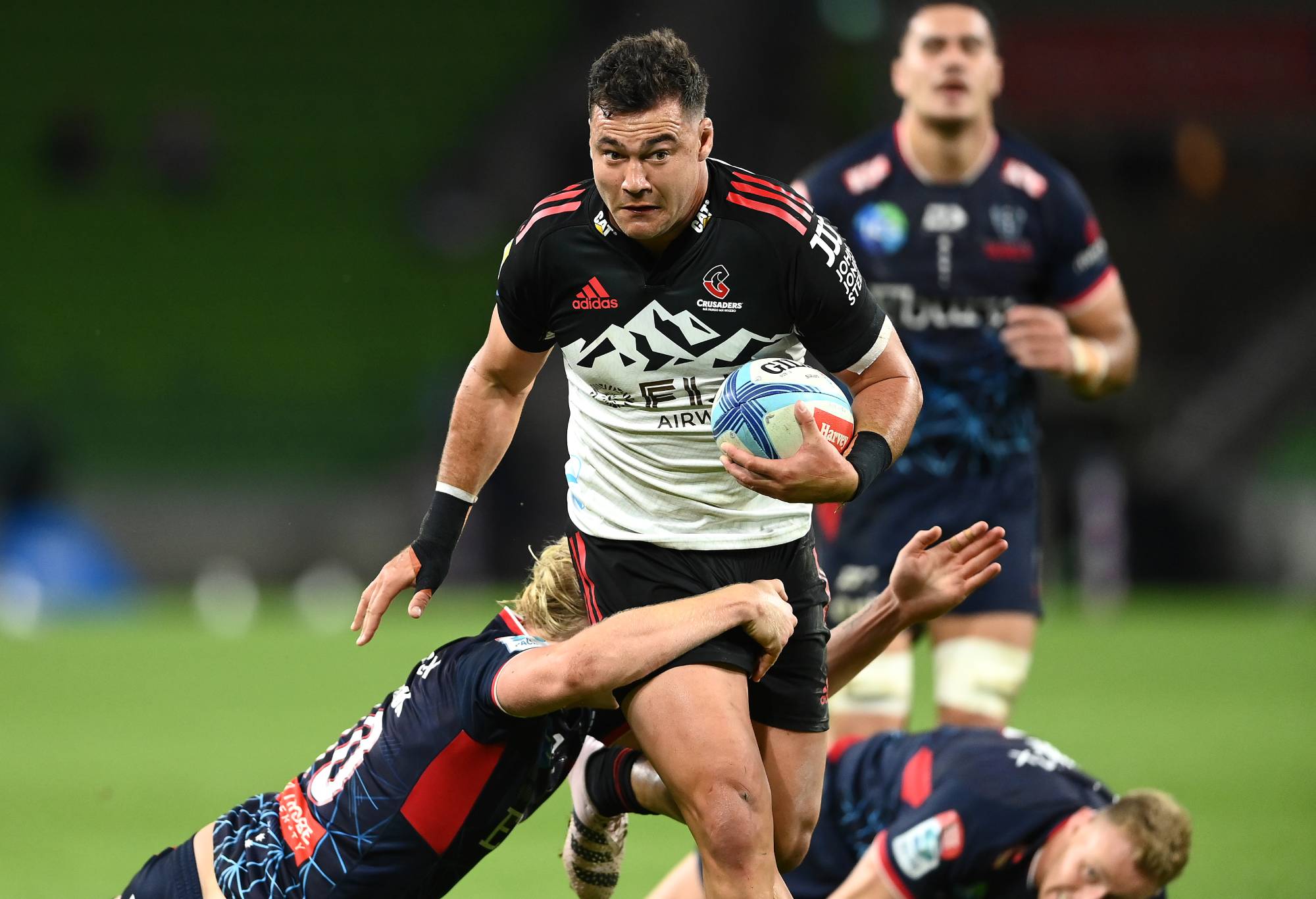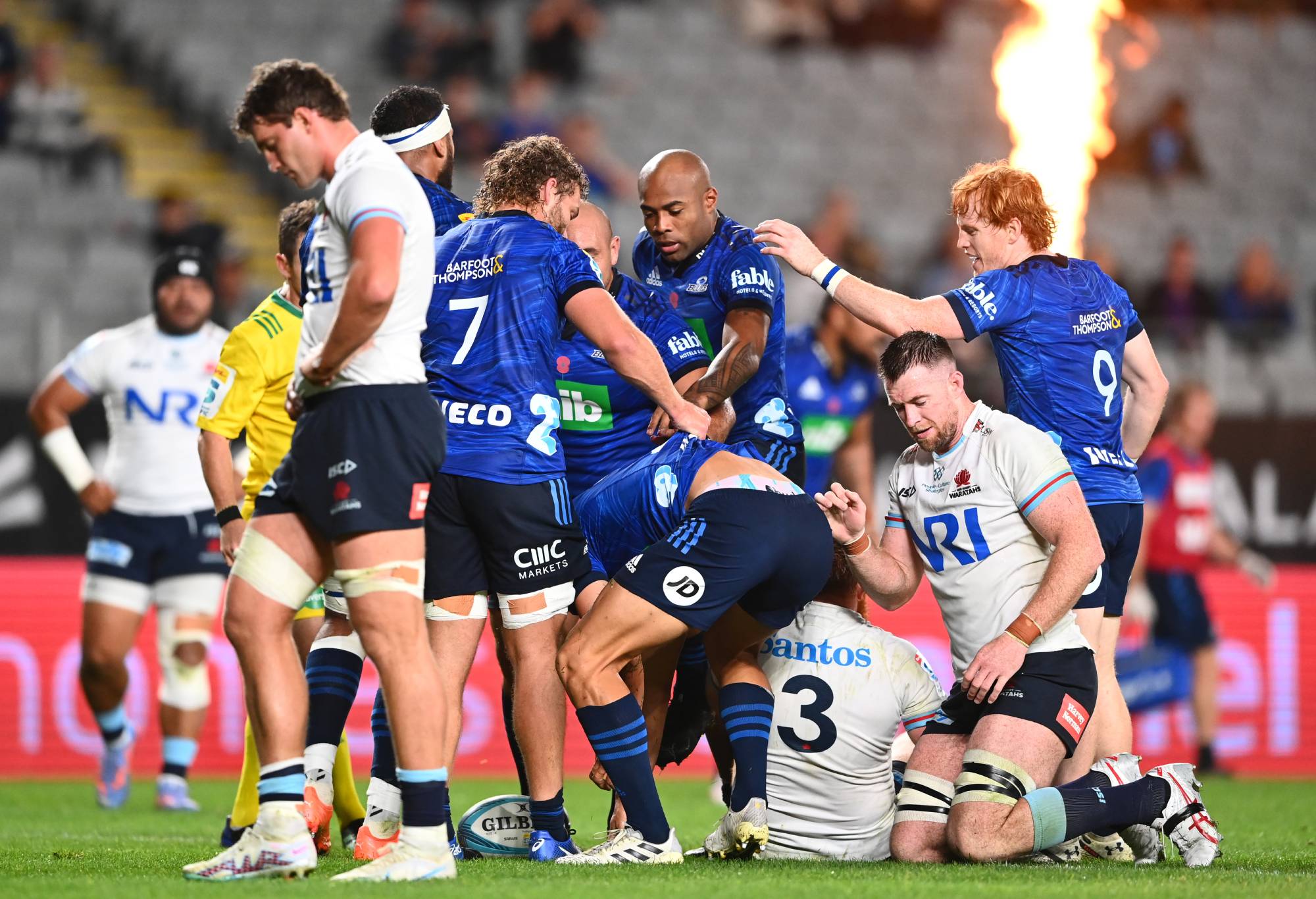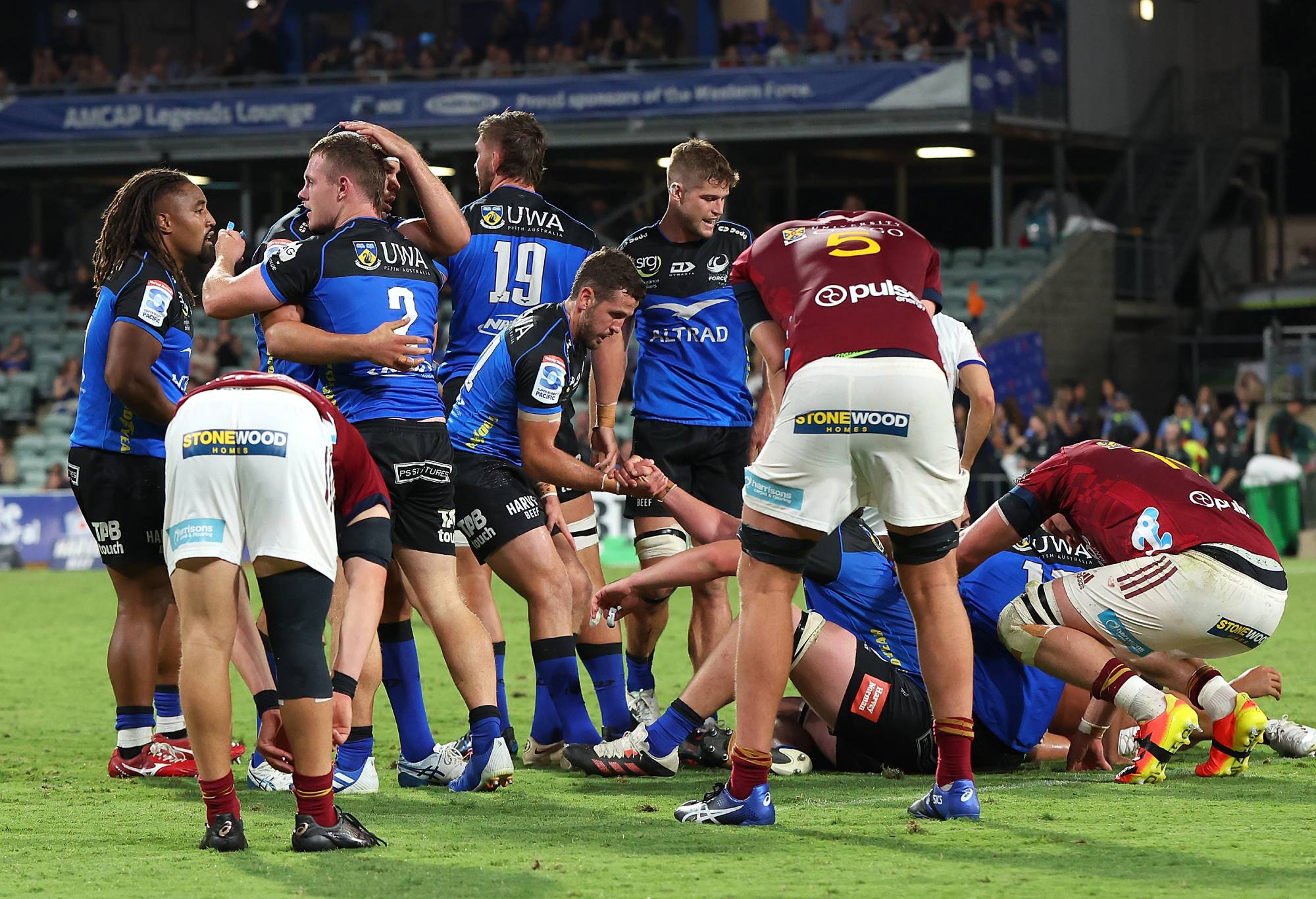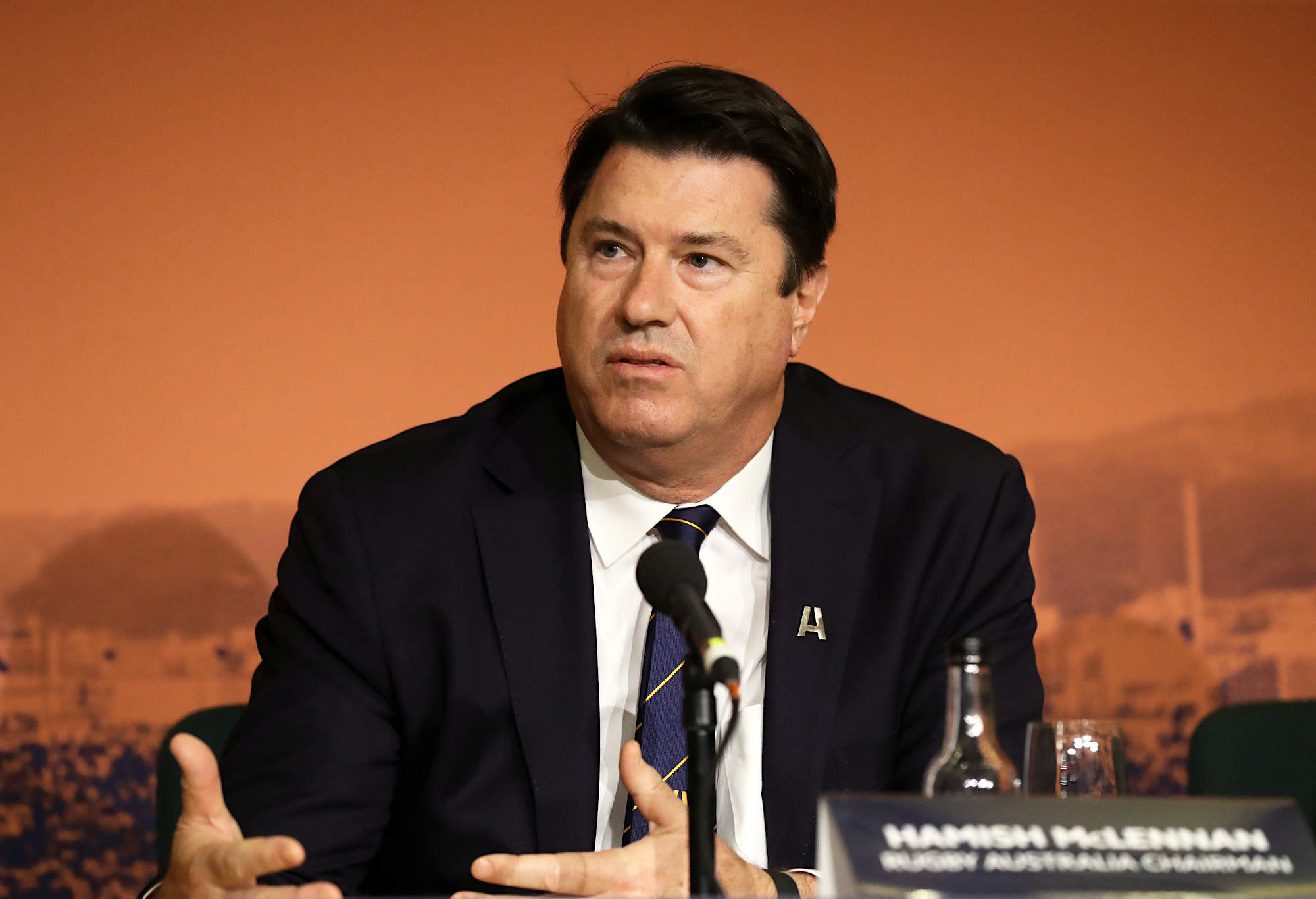The Drua put in a fair defensive effort on Friday night in Hamilton, yet still found themselves on the end of a 50-17 score-line. Such is the harsh reality of the class divide between the upper and lower reaches of Super Rugby.
Many moons ago, playing for the Dunedin Rugby Club, I came under the wing of renowned New Zealand Olympic swimming coach, Duncan Laing. Duncan was a hard task master on the rugby field; taking perverse pleasure in having us grind out laps of Kettle Park, invariably with an Antarctic southerly whipping off the St Kilda beach dunes, grainy sand pellets stinging our faces.
The one thing big Dunc – a huge boulder of a man who had long surrendered to his wife’s cooking – couldn’t abide more than anything else, was players taking the field without ensuring they had properly attended to their gear. That meant having the right studs for the conditions, and bootlaces double-tied.
Any player who stopped during a game to re-tie their laces was guaranteed a bollocking in the sheds and reassignment to the seconds the following week, no excuses tolerated.
Damian McKenzie is enjoying a fine season for the Chiefs. Fine enough to have many pundits elevating him from fringe, squad player status, to an essential pick for the All Blacks’ World Cup campaign.
But the regularity with which he slipped over on Friday night – as he has done in other matches, even without the rain that enveloped Hamilton’s Rugby Park – McKenzie can consider himself fortunate that it is Ian Foster and not Duncan Laing who will be in charge of selection.
It also says something about the Chiefs that the worst thing that can be said about a side now eight wins from eight matches, is that their main playmaker needs to wear longer studs.
In Melbourne, the Rebels did a lot of things right in the first half, and the Crusaders did a few things wrong. At 24-12, an upset was on the cards.
It was exciting rugby, Brad Wilkin embarrassing Tamaiti Williams at his ruck post to sneak over, then from the kick-off Josh Kemeny clattering into David Havili, for the ball to fall to Vaiolini Ekuasi to gallop 85 metres untouched.
One thing that stands the Crusaders apart from other sides is their self-belief, and they were relentless in the second half, in the way they kept recycling and probing for stress points in the Rebels’ defence.
No matter that it took until the final quarter for the Crusaders to regain the lead, or that they fell behind again 27-26, with 13 minutes left to play; the Rebels’ showreel defensive hits stopped coming, the red scrum won the important contests, replacement halfback, 36-year-old Willi Heinz, fired passes as crisp and long as you’d ever want to see, and space was created for Richie Mo’unga, Havili and Jack Goodhue to work with.

(Photo by Quinn Rooney/Getty Images)
It wasn’t that the Rebels were without opportunities in the second half, but errors – fatigue and discipline related – began to creep in. With their recycle effectively slowed down, too much of the Rebels’ play became static; the antithesis of what has been working for them this season.
For the Crusaders, file this one under just the kind of tough contest they wanted, coming off a bye, heading into next week’s heavyweight re-match in Hamilton.
For the home side, 43-27 felt like a harsh return. File under more promising signs, a team demonstrably heading in the right direction, but yet to develop the consistency and clinical edge of the best sides.
Bench impact continues to be problematic; some players failing to tap into the game situation and the referee. It’s a tricky role; being required to add something extra, but also needing to fit seamlessly into the pattern already established. Expect some soul-searching this week and a real focus on the Rebels playing as a 23, not 15.
Interestingly, the Rebels’ next opponent, Moana Pasifika, are experiencing similar issues this season; ultra-competitive, showing flair and improved cohesion in attack, but failing to see out the whole 80 minutes.
It’s very easy for armchair critics to point out the obvious; ‘keep doing what you were doing in the first half’, ‘get fitter’ and so on, but I’d suggest that Rebels’ fans don’t get too down on themselves or their team. This feels to me like a normal progression.
It’s a long way from the 40-50 point floggings of last year, to winning this year; one giant step for mankind as the saying goes. The Rebels being truly competitive for such long periods against the Hurricanes, Blues and Crusaders is, in itself, a worthy step forward. Not good enough of course, but a necessary step on the way towards eventually turning those promising, improved performances into wins.
The Rebels’ challenge now is to take that promise into games against sides in the bottom half of the ladder; games they should and must win for their season to be rated a success. With Moana Pasifika thinking exactly the same thing, next weekend in Auckland shapes as an intriguing contest.
The Blues’ 55-21 win over the Waratahs was far less entertaining than the score might suggest. The result felt pre-ordained, the match as a result lacking intensity and gravitas; two sides doing exactly what was expected of them, on the way to an inevitable score-line.

(Photo by Hannah Peters/Getty Images)
As other sides have done this year, the Waratahs chose to pick their moment, leaving key players like Michael Hooper and Mark Nawaqanitawase at home. Their ‘powder dry’ assignment is next week, hosting the Highlanders.
None of which is any excuse for a host of Waratahs players to be pinged twice for advancing offside, in front of the kicker, without having been put on-side. These are needless penalties that provide the offenders with little or no potential benefit anyway but invariably cost huge metres.
And what was rangy Will Harris up to; starved of running opportunities all night, running onto a clever kick-off, yet failing to back himself to run past, through or over the final defender?
The Force’s 30-17 win over the Highlanders wasn’t quite the “huge scalp” that Stan’s Drew Mitchell described it as, nevertheless, in this competition, any win is a good win. With the worst of their schedule out of the way, the Force are another side to be delivering better results against New Zealand opposition this year, and now have a good opportunity to maintain their current position in the Top 8; notwithstanding the frustrating gulf that exists between their best rugby and their worst.
For their part, the Highlanders lacked discipline, on-field leadership, and, when they finally got an opportunity at the end of a wretched first half, patience.
Their intensity lifted after the break, but with Shannon Frizell dropping the ball over the goal-line, and Marino Mikaele Tu’u somehow being held up, they never had the finesse nor the legs to recover a 24-3 deficit.
To illustrate how muddled their thinking was, with referee Nic Berry handing out cards like a nightclub spruiker, instead of forcing hesitant defenders to make a risky play in the red zone, twice the Highlanders’ backs grubbered into a thicket of legs, and easily conceded possession.
It was the same inept tactical nous shown when the Highlanders were down to 13 men before half-time, with the Force having no real idea how to manipulate that numerical advantage and convert it to points, and the Highlanders, instead of knuckling down and retaining possession, meekly kicking it back to the Force at every opportunity, inviting them to figure it out. Which of course, they eventually did.

(Photo by Paul Kane/Getty Images)
With only four matches played – the last of the split bye rounds – there was plenty of airspace for the issues that really matter in rugby to take centre stage. I’m talking of course of the “code war” that some would have us think has erupted, between rugby and rugby league.
You know the one; still smarting from losing Joseph Suaalii, rugby league, now rocked by the prospect of losing Payne Haas to rugby, has struck back, reclaiming Roger Tuivasa-Sheck. And so on.
There are some obvious points to be made. I’d lay London to a brick that the vast majority of rugby fans couldn’t pick Haas out of a line-up, nor care a jot if he lined up for the Reds or the Brisbane Broncos.
Tuivasa-Sheck’s decision to go back to the New Zealand Warriors is nothing more than him reaching a sensible conclusion that he has more opportunity in a game that he is demonstrably better suited for.
Not so according to league writer David Riccio who touted this news as “the biggest signing coup in the club’s (the Warriors) history”, a “bombshell for both codes”, and a “significant win” for “the NRL who have scored in their battle with Rugby Australia”.
What Tuivasa-Sheck, a domiciled New Zealander and an All Black, shifting from the Blues to the Warriors has to do with Rugby Australia is anybody’s guess, but hey, everyone knows that in war, truth is always the first casualty. Especially a phoney war.
At the heart of this nonsense are two generals with an insatiable desire to implant themselves as the centre of the story. ARL Commission boss Peter V’Landys was at pains to point out; “If Hamish McLennan is looking for free publicity, we’re not going to entertain it. His sport isn’t doing very well so he tries to use our sport to publicise them,” he said last week.
“I won’t be falling into that trap,” he added – while doing exactly that.
Incredibly, V’Landys doubled down yesterday on his threat not to give the rugby bonfire any more oxygen, by ordering in a petrol tanker, in the form of plans to allow NRL clubs salary cap concessions to target rugby players.

(Photo by Oisin Keniry – World Rugby/World Rugby via Getty Images)
How he might prevent NRL players from switching to rugby, then returning to league at a later date, on inflated salaries, aided by the newly available concession, wasn’t made clear at the time of writing.
McLennan’s modus operandi is to toss out bait via The Australian, knowing two things; the publication is naïve enough to consider it news, and V’Landys can’t help but swallow the hook.
At a superficial level, that might seem clever; any publicity is good publicity and all that.
But it is also tiresome and demeaning, for a rugby audience that has endured over two decades without success. What Australian rugby fans want is a financially sound game, with healthy junior and grassroots participation, male and female, with clear pathways for the development and advancement of players, coaches and referees, all providing a solid footing for better results in Super Rugby and Test rugby.
Two egotists swinging their appendages in public does not make for a ‘code war’.
After the Rebels versus Crusaders match, coach Scott Robertson spoke of catching up with his friend and Melbourne Storm coach, Craig Bellamy, and also revealed that Storm player Christian Welch had just been involved in a Crusaders’ jersey presentation.
Storm and Rebels players regularly socialise and play golf together. Tuivasa-Sheck will return to the Warriors with grace and the well wishes of everyone in rugby who knows him. How’s that for a code war?
Never one to criticise without offering an alternative or a solution, here’s some free advice for both McLennan and V’Landys. You’ve both got serious issues to deal with; matters that will actually shape and influence the future of your sports.
In rugby league’s case, how to deal genuinely and intelligently with the issue of head and brain injury, and in the case of rugby, how to leverage its pending private equity windfall into sustainable, long-term benefits for the game.
On the evidence shown so far, don’t hold your breath waiting for either of those things to happen.
































































































